3.1 — Bargain Theory of Contract
ECON 315 • Economics of the Law • Spring 2021
Ryan Safner
Assistant Professor of Economics
safner@hood.edu
ryansafner/lawS21
lawS21.classes.ryansafner.com
Summing Up So Far
Suppose we set up rules, and everyone does what’s best for them within the rules
- What rules do we want to set up, if we want efficient outcomes?
Some ideas:
- Coase: initial rules don’t matter for efficiency if transaction costs are low
- More complicated rules can lead to more efficient use of a resource, but at higher cost
- Injunctive relief when transaction costs are low, damages when costs are high
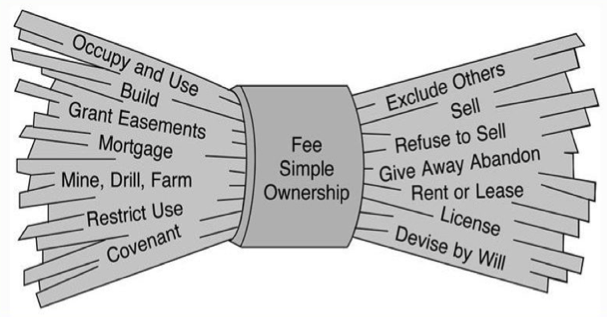
Transaction Costs of Bargaining
When two parties want to reallocate rights
- I want to buy your car
- Or you want to “buy” my permission to have a noisy party
- Or neighbors want to pay a factory to pollute less
We’ve assumed they’ve been able to do so
- Maybe with some transaction costs

The Timing of Exchange
But there are many other bargaining costs that make exchanges difficult
Example: one type of problem is timing
“Spot” transactions happen on the spot
- I hand you a check and you hand me keys to your car
- You pay for a restaurant meal
- Maybe some search & bargaining costs, but no enforcement costs

The Timing of Exchange
Many transactions are more complex
- Neighbors pay factory to pollute less going forward
- What if technology/cost changes, factory wants to pollute more?
Other examples:
- Booking a flight
- Painting a house
- Fixing a car
There’s now additional enforcement costs to ensure parties uphold their side of the bargain

Contracts
A contract is a promise that is legally binding
- Courts will enforce many (but not all) promises
Point of contracts: enable trades where the transaction is not concluded immediately (non-spot transactions)

Making Promises Credible
Simple agency or trust game
Principal decides to invest money ($100) with Agent
- Investment grows to $200
Agent can then keep or share the returns with Principal
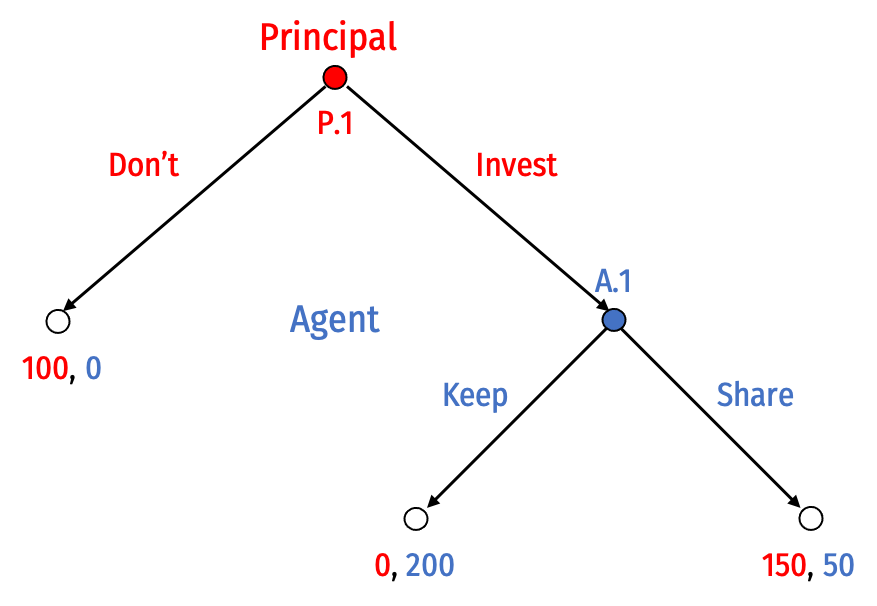
Making Promises Credible
Simple agency or trust game
Principal decides to invest money ($100) with Agent
- Investment grows to $200
Agent can then keep or share the returns with Principal
SPNE: (Don't, Keep)
- Inefficient outcome; Pareto improvement possible
- A promise to Share is not credible
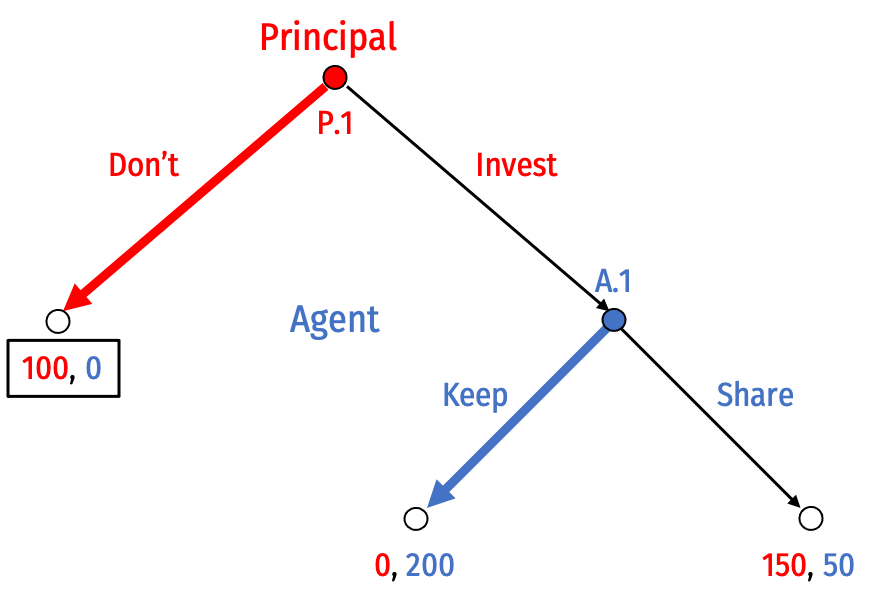
Making Promises Credible
One solution: reputation, which acts like a forfeitable bond
If Agent chooses to Keep, will lose -H, which is “hostage” value
- Principal will earn αH, where α is the faction of H that is valuable to Principal
- α=0: hostage has no value to Principal
- α=1: cash
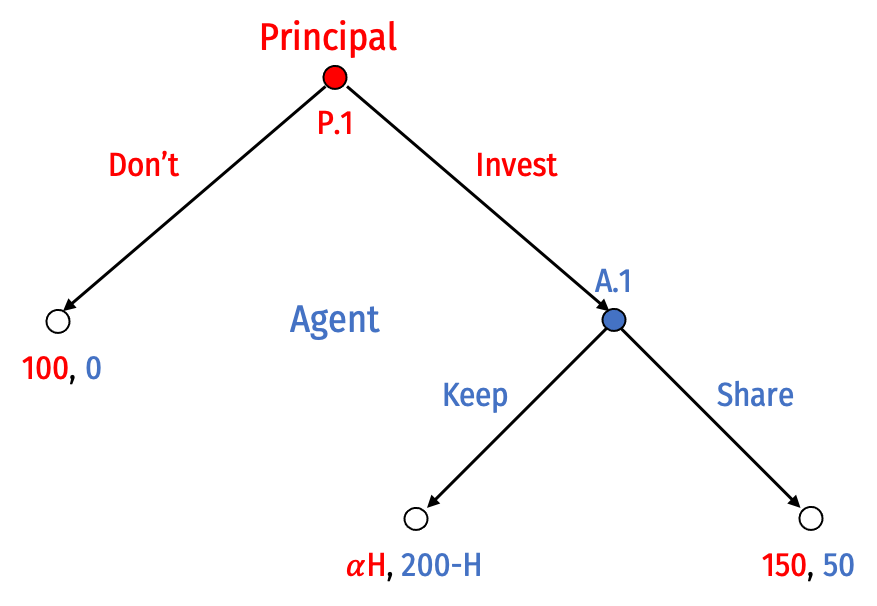
Making Promises Credible
One solution: reputation, which acts like a forfeitable bond
If Agent chooses to Keep, will lose -H, which is “hostage” value
- Principal will earn αH, where α is the faction of H that is valuable to Principal
- α=0: hostage has no value to Principal
- α=1: cash
If H>150, SPNE: (Invest, Share)
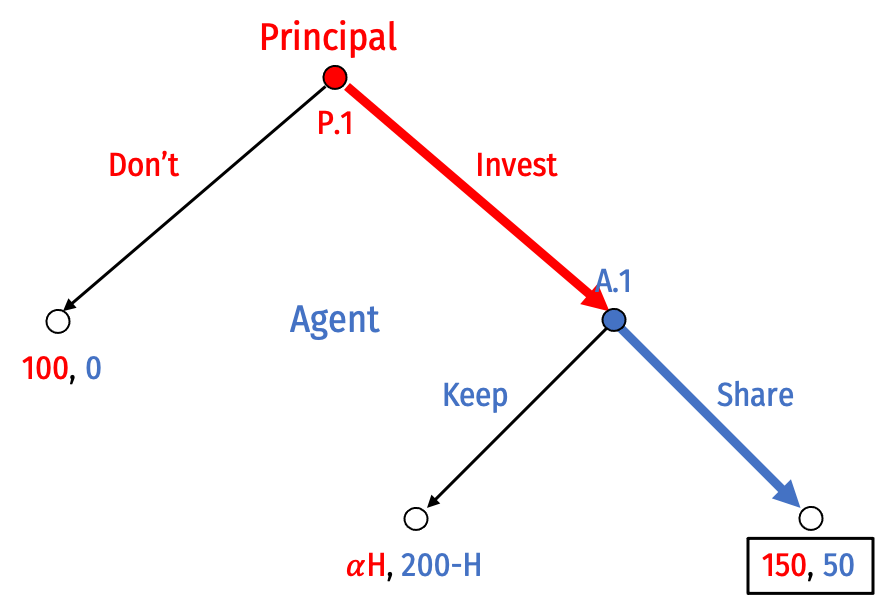
In The Old Days, These Were Actual Hostages

Williamson, Oliver E, 1983, “Credible Commitments: Using Hostages to Support Exchange,” American Economic Review 73(4): 519–540
Today We Often Hold Property Hostage as Collateral

Williamson, Oliver E, 1983, “Credible Commitments: Using Hostages to Support Exchange,” American Economic Review 73(4): 519–540
Making Promises Credible
However, reputation has limits
Works best with repeated interactions where Agent cares about prospect of (lost) future business
- Large enough H
What about one-shot interactions like this?

Making Promises Credible
- Suppose instead we have courts enforce a promise to Keep
- Court will force Agent to give $150 to Principal
- Litigation cost of using courts c to each party
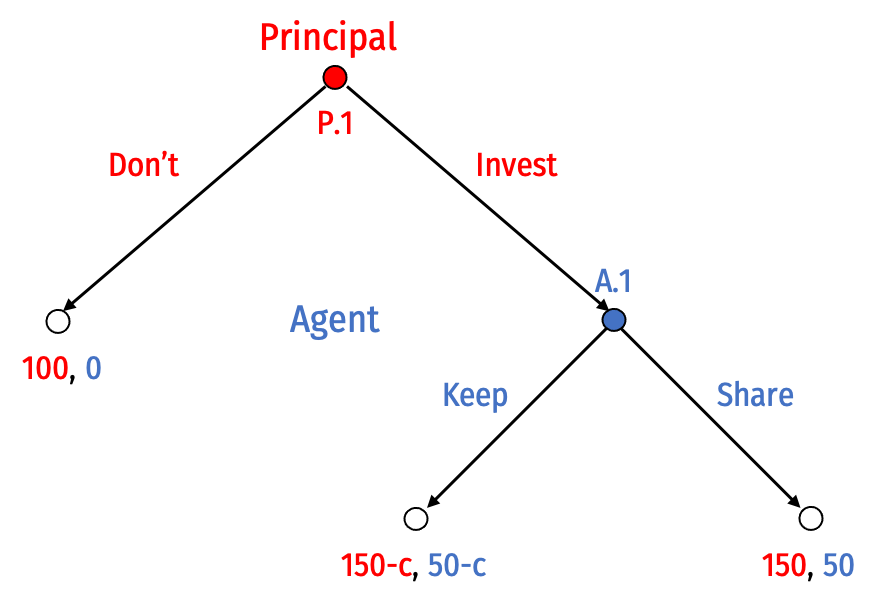
Making Promises Credible
Suppose instead we have courts enforce a promise to Keep
- Court will force Agent to give $150 to Principal
- Litigation cost of using courts c to each party
With c>0, SPNE: (Invest, Share)
- Purpose of contract law is to make promises credible
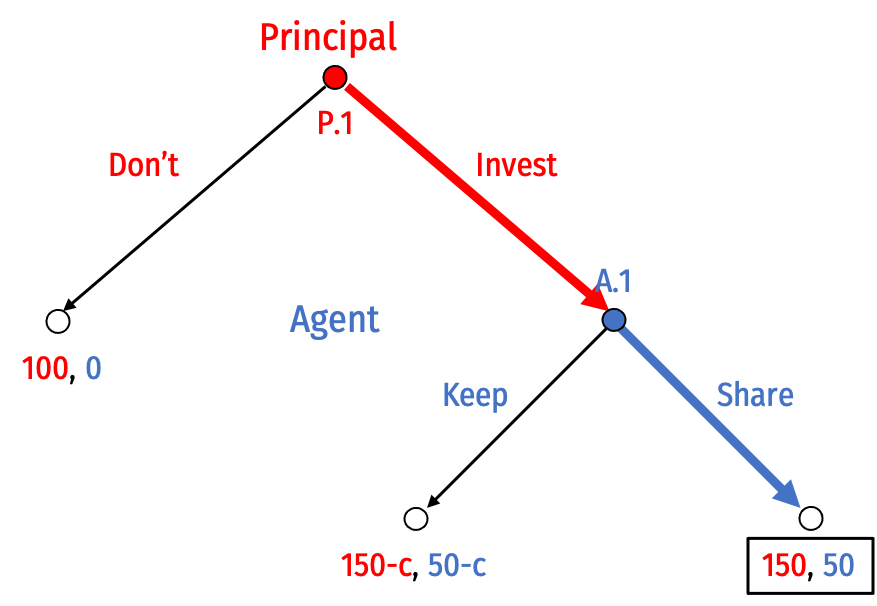
Motivations of Contract Law
What kinds of promises should be enforceable at law?
What should the remedies be for a broken promise?

What Promises Should be Enforceable?
“The rich uncle of a struggling college student learns at the graduation party that his nephew graduated with honors. Swept away by good feeling, the uncle promises the nephew a trip around the world. Later the uncle reneges on his promise. The student sues his uncle, asking the court to compel the uncle to pay for a trip around the world.”
What Promises Should be Enforceable?
“The rich uncle of a struggling college student learns at the graduation party that his nephew graduated with honors. Swept away by good feeling, the uncle promises the nephew a trip around the world. Later the uncle reneges on his promise. The student sues his uncle, asking the court to compel the uncle to pay for a trip around the world.”
“One neighbor offers to sell a used car to another for $1000. The buyer gives the money to the seller, and the seller gives the car keys to the buyer. To her great surprise, the buyer discovers that the keys fit the rusting Chevrolet in the back yard, not the shiny Cadillac in the driveway. The seller is equally surprised to learn that the buyer expected the Cadillac. The buyer asks the court to order the seller to turn over the Cadillac.”
What Promises Should be Enforceable?
“The rich uncle of a struggling college student learns at the graduation party that his nephew graduated with honors. Swept away by good feeling, the uncle promises the nephew a trip around the world. Later the uncle reneges on his promise. The student sues his uncle, asking the court to compel the uncle to pay for a trip around the world.”
“One neighbor offers to sell a used car to another for $1000. The buyer gives the money to the seller, and the seller gives the car keys to the buyer. To her great surprise, the buyer discovers that the keys fit the rusting Chevrolet in the back yard, not the shiny Cadillac in the driveway. The seller is equally surprised to learn that the buyer expected the Cadillac. The buyer asks the court to order the seller to turn over the Cadillac.”
“A farmer, in response to a magazine ad for “a sure means to kill grasshoppers,” mails $25 and receives in the mail two wooden blocks with the instructions, “Place grasshopper on Block A and smash with Block B.” The buyer asks the court to require the seller to return the $25 and pay $500 in punitive damages.”
Cooter and Ulen, Ch.8
The Bargain Theory of Contracts
The Bargain Theory of Contracts
Legal theory developed in late 19th-early 20th Century
A promise should be enforced if it was given as part of a bargain, otherwise, it should not
Ideal bargain taken to have three classic elements:
- offer
- acceptance
- consideration

The Bargain Theory of Contracts: Terms
Promisor: person who gives a promise
Promisee: person who receives a promise
In a bargain, both sides must give up something: reciprocal inducement
Consideration: what promisee gives to promisor, in exchange for promise
- Under bargain theory, this is what makes contract enforceable

What Promises Should be Enforceable?
“The rich uncle of a struggling college student learns at the graduation party that his nephew graduated with honors. Swept away by good feeling, the uncle promises the nephew a trip around the world. Later the uncle reneges on his promise. The student sues his uncle, asking the court to compel the uncle to pay for a trip around the world.”
- No consideration given as inducement for promise (it's a gift), therefore, not enforceable
What Promises Should be Enforceable?
“One neighbor offers to sell a used car to another for $1000. The buyer gives the money to the seller, and the seller gives the car keys to the buyer. To her great surprise, the buyer discovers that the keys fit the rusting Chevrolet in the back yard, not the shiny Cadillac in the driveway. The seller is equally surprised to learn that the buyer expected the Cadillac. The buyer asks the court to order the seller to turn over the Cadillac.”
- Despite consideration, offer and acceptance not met, so not enforceable
- No “meeting of the minds”
- Seller (thought they) offered one thing
- Buyer (thought they) accepted another
What Promises Should be Enforceable?
“A farmer, in response to a magazine ad for “a sure means to kill grasshoppers,” mails $25 and receives in the mail two wooden blocks with the instructions, “Place grasshopper on Block A and smash with Block B.” The buyer asks the court to require the seller to return the $25 and pay $500 in punitive damages.”
- Under bargain theory, a valid promise, hence, enforceable
No Distinctions Between Fair & Unfair Bargains
Bargain theory of contract does not distinguish between fair and unfair bargains
Even a highly one-sided bargain is enforceable under the theory
- Courts should not determine whether bargain is “fair,” only whether a bargain occurred

No Distinctions Between Fair & Unfair Bargains
- Too difficult to have a theory of what is “fair” and have court only enforce fair bargains
- Court would have to calculate value of contract to each party and make sure they were about equal

No Distinctions Between Fair & Unfair Bargains
Hamer v. Sidway (1891) 124 N.Y. 538, 27 N.E. 256
Uncle promised his nephew $5,000 to abstain from drinking, smoking, and gambling until his 21st birthday...then refused to pay
- Some complications, but that's the basic story
Court: a bargain occurred, Uncle owes damages
- nephew’s (promisee) abstention from stimulants counts as consideration in exchange for promise
- Uncle’s (promisor) promise should be enforced

No Distinctions Between Fair & Unfair Bargains

“The promisee [previously] used tobacco, occasionally drank liquor, and he had a legal right to do so. That right he abandoned for a period of years upon the strength of the promise...We need not speculate on the effort which may have been required to give up the use of these stimulants. It is sufficient that he restricted his lawful freedom of action within certain prescribed limits upon the faith of his uncle’s agreement, and now, having fully performed the conditions imposed, it is of no moment whether such performance actually proved a benefit to the promisor, and the court will not inquire into it.”
Remedies: According to Bargain Theory
Expectation damages: amount of benefit the promisee could reasonably expect from performance of the promise
Since promisee agreed to bargain, owes it to promisor to make her as well off as she would have been if the promise had been performed
- but sometimes difficult to calculate, hence, reasonable standard
- still lots of ambiguity (quality, tradeoffs, etc.)

The Limits of Bargain Theory
- Bargain theory of contract highly influential, but two major problems:
- Not an accurate description of what courts actually do
- Courts do sometimes rule some contracts “unconscionable”
- Not always economically efficient
- Would not enforce some promises that both parties want to be enforceable
- Enforces some promises that should not be enforced
- Often due to lack of consideration

What Promises Should be Enforced, for Efficiency?
Efficient: enforce a promise if both the promisor and the promisee wanted it to be enforceable when it was made (ex ante)
- Note: very different from wanting it to actually be enforced (ex post)!
First purpose of contract law: enable people to cooperate and capture gains from trade
- convert games with noncooperative equilibria to games with cooperative equilibria
- make promises credible
- minimize deadweight loss from lost trading opportunities

The Problem of Credible Commitment


The basic problem is credible commitment
- A much general problem in game theory & political economy
"Talk is cheap"
With perfect information, promises or threats will not change equilibrium if they are not credible
Strategy must be subgame perfect, if game reaches the relevant decision, it must be in your interest to carry out your promise or threat!
The Problem of Credible Commitment


Threats and promises can be credible with commitment
A commitment changes the game in a way that forces you to carry out your promise or threat, especially when you otherwise would not want to
- tying your own hands makes you stronger!
The Problem of Credible Commitment

The Problem of Credible Commitment
A commitment device can bind yourself in the future to obey your current wishes for the future
What doesn't kill you makes you stronger
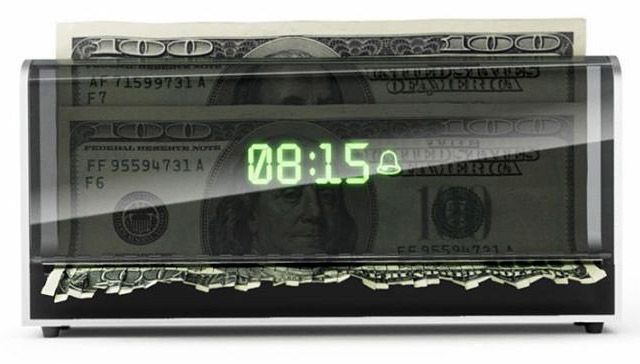

Credible Commitment and Bargaining

Thomas Schelling
1921—2016
Economics Nobel 2005
“‘Bargaining power’..s that the advantage goes to the powerful, the strong, or the skillful. It does, of course, if those qualities are defined to mean only that negotiations are won by those who win...The sophisticated negotiator may find it difficult to seem as obstinate as a truly obstinate man...“Bargaining power [is] the power to bind oneself.”, (p.22)
Schelling, Thomas, 1960, The Strategy of Conflict
Credible Commitment and Bargaining

Thomas Schelling
1921—2016
Economics Nobel 2005
“How can one commit himself in advance to an act that he would in fact prefer not to carry out in the event, in order that his commitment may deter the other party? ... In bargaining, the commitment is a device to leave the last clear chance to decide the outcome with the other party, in a manner that he fully appreciates; it is to relinquish further initative, having rigged the incentives so that the other party must choose in one’s favor. If one driver speeds up so that he cannot stop, and the other realizes it, the latter has to yield...This doctrine helps to understand some of those cases in which bargaining ‘strength’ inheres in what is weakness by other standards, (p.22)
Credible Commitment

Odysseus and the Sirens by John William Waterhouse, Scene from Homer's The Odyssey
Credible Commitment

Credible Commitment and Bargaining

Sun Tzu
544—496 B.C.
“When your army has crossed the border [into hostile territory], you should burn your boats and bridges, in order to make it clear to everybody that you have no hankering after home.”
Sun Tzu, The Art of War
Credible Commitment and Bargaining
Contract law can provide that commitment device
Threat of legal punishment for breaking promises “ties your hands” and forces you to keep more promises, on the margin
Easier to enter into a promise you would otherwise want to “wiggle out of” later

Efficient Disclosure of Information
A related purpose of contract law: encourage the efficient disclosure of information
Recall the problem of private/asymmetric information for bargaining
- e.g. Lemons problem in used car market (Akerlof 1972)
- contract law can help: seller can issue a legally binding warranty; or impose on seller a duty to disclose information about car's quality
Makes more trade possible by providing credible commitments!
